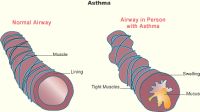Results of a new study find that a component found in a mother’s breast milk may reduce her baby’s risk of developing asthma.
French researchers believe that their findings could have huge implications as this may help them to understand why some children are more susceptible to asthma and others are not.
For their study, researchers exposed lactating mice to airborne dust containing ovalbumin, a well-known asthma allergen that is found in egg whites.
Those mice who breastfed, were much less likely to develop asthma related symptoms as those who were not.
It is believed that a component in breast milk called TGF beta is what offers the protection from asthma.
“Breast-feeding induced tolerance may rely on both the chronic administration of an antigen at a low dose, a setting known to promote tolerance induction, and the presence of milk-borne TGF beta,” they suggest.
It is estimated that asthma effects more than 300 million people from all corners of the world.
The researchers wrote: “This study may pave the way for the design of new strategies to prevent the development of allergic diseases.”
Sally Rose, an asthma nurse specialist at Asthma UK, said: ‘While some research does suggest that breastfeeding may help reduce the chance of babies developing allergic conditions such as asthma, there are other studies that contradict this.
“Because breastfeeding provides many proven benefits for babies, current advice from the Department of Health, which Asthma UK supports, is that, where possible, babies should be exclusively breastfed for the first six months of life.”

Leave a Reply